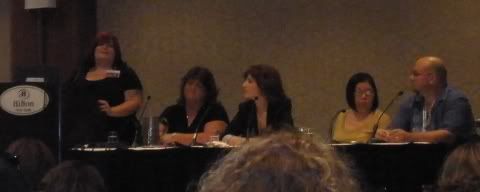 |
| Click on the image to visit Engage with Grace…. But read the below first. |
Education (and appropriate paperwork) about end of life wishes is a cause I support 100%. When my husband was in hospice, unable to speak, I found out that advance health care directives (often known as "living wills") have their limits. While Gavin's documentation laid out basic guidelines on his eventual care, the number of medical situations possible was too complex to really use the paper as a strict guide. I was protected by the document but it was most helpful to also have had many conversations through the years — and to have been through many, many junctures with him where a decision in cancer treatment was necessary — to really interpret and make decisions on his behalf. (He also had a living will, which in our state is more limited in scope, and I was his health care proxy, which is a tool that gives me power to make decisions when he can't). (You can read more about the evolution and limitations of these very important documents on Wikipedia here).
(Which all maybe reads as pretty funny when you consider I've spent the better part of my time in the last four years bemoaning how little thought we gave to his eventual death: no paradox, he'd had all this drawn up when we got married because he had had life-threatening heart problems in the early 90s. The conversation post-cancer is the one I fixate on, for better or worse.)
And I loved participating in Engage with Grace, the "blog rally," last year. (Plus, there were jokes.)
This year I just couldn't.
My resistance made me stop. Why is this year different? I realized that what I do online has changed so much in that period. At Thanksgiving last year, I was just just a month or so into the support activity I do on Facebook. That community and its development is another long story, and one I intend to tell, but it's relevant here to say just: last year I didn't know how many people I touched. I was 3 years out from my loss, and my blog was all about ME. Yes, there was a community aspect, but it wasn't very… vivid to me. Today I've been through nearly a full year of hearing from widowed people — many fresh in the face of their loss — about EVERY DAY. About their hurts, their triggers, their traumas. Yes, it's wonderful to have created a space for them to share, to be validated, to find their own ways in helping others grow. But I never expected to be doing that type of activity on Facebook at all, and certainly not to devote so much time to it or for it to take the shape(s) that it has.
But the fact is that now, I know really vulnerable people are listening. They care what I think, and I hear that the holidays are the trigger and trauma to beat all others. I have heard them winding down as the light has fallen all autumn long. Through the interwebs I can smell their anticipation of the laden table, the loaded question, the family member who "doesn't get it" and wants them "to move on, already."
Widowed people are powerful advocates for Hospice, end-of-life planning, grief literacy, and other areas where our society is changing quickly. But most of the people who respond to my widows' activities online are just concerned about surviving the holidays. They are -- they need to be -- in one-day-at-a-time mode.
Many of you are scared and hurting. I just can't throw this in your face and ask you to participate this year. I can't avoid all triggers (I'm not really all that sensitive) and many of you expect me to handle tough topics, but it just didn't feel right to engage this full-on this year.
If you want to click through, you're welcome to. Engage with Grace is a loving and accessible way to discuss end of life care with family members at the holidays. I strongly recommend it. And of course, I know not all my readers are widowed people. But the ones who are on the edge, ARE.
I still share my own experiences, and because I'm anonymous I can be uncensored in those. I believe you'll respect these horrors and delights as sharing.
This year this community is a different one than it was, and I am a different sort of advocate now.
And for that — and for all of you — broken wide open and present for each other EVEN NOW — I am so very thankful.










